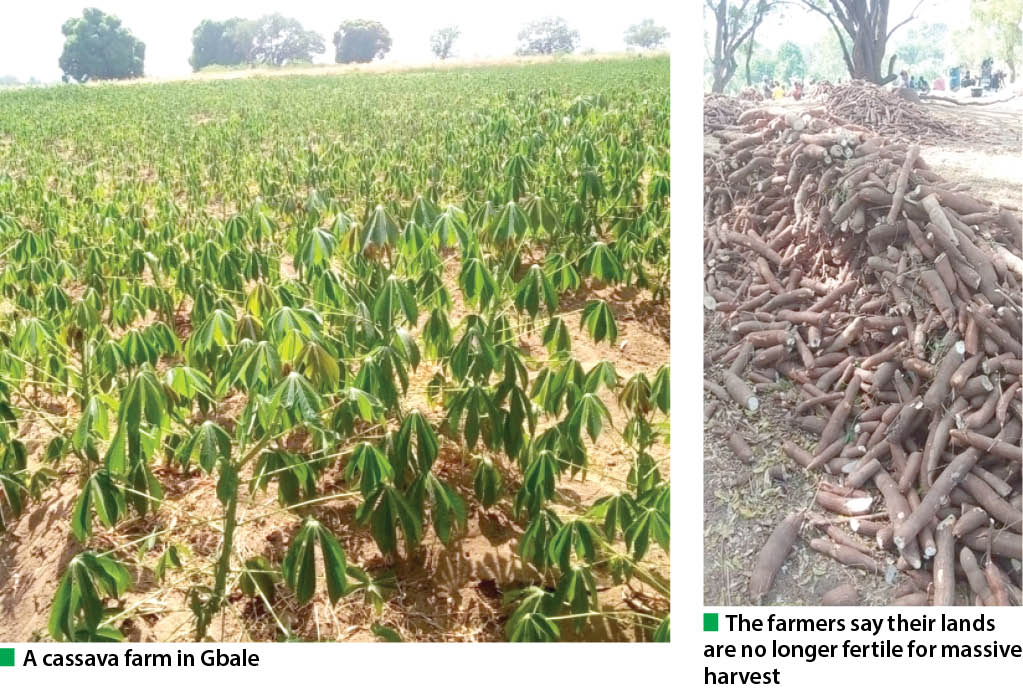Kwara farmers battle bad roads, insecurity, depreciating soil
Many communities in Lafiagi ward III in Edu Local Government Area of Kwara State are noted for massive cassava production. They include Zambufu, Gale, Masha, Guye, Gbugbu and many others. Farmers in these communities have no other major crop than cassava, which they have been farming for decades. When our correspondent visited some of the […]

Many communities in Lafiagi ward III in Edu Local Government Area of Kwara State are noted for massive cassava production. They include Zambufu, Gale, Masha, Guye, Gbugbu and many others.
Farmers in these communities have no other major crop than cassava, which they have been farming for decades.
When our correspondent visited some of the communities recently, the farmers expressed fears that their age-long occupation was under serious threat.
The dusty road from Zambufu, the headquarters of the ward, to Gbale community, was filled with potholes, with some places almost cut off by erosion, a confirmation of the difficulties the farmers later shared.
An elder in the community, Mallam Ibrahim Gbale, who has been farming cassava for over 40 years, said the land was becoming infertile because of the continued pressure on it.
“We have been farming on these lands since I was born, so you should know what that means to the soil. It has depreciated and is no longer fertile. Now, we have to use fertiliser before the cassava can do well. And look at the price of fertiliser now,” he said in Nupe language.
He also complained of incessant attacks on farmers by herders, a situation he said was heightening tension in the community.

“You know cassava is a tuber crop which takes at least one and half years to mature. Unfortunately, in the dry season herders usually invade the farms with their animals and destroy the crops. It is a serious threat,” he added.
Mallam Gbale said that in his community and some other neighbouring ones, nearly 1,000 farmers engage in cassava farming, producing large tons on a yearly basis.
He, however, said they had not received any intervention from government, adding that the community had been abandoned for a long time.
“As you could see when you were coming, the roads are in a terrible condition. Moving the cassava from the community to the nearest market has been the major problem. Commercial vehicles have little interest in coming to the communities because of the bad nature of the roads. And this has made it very difficult to move our produce to markets in Tsaragi and Gbugbu,’’ he further said.
Dauda Mohammed, another farmer in the community, also said the depreciating situation of their farmlands and the conflict between farmers and herders were the major problems.
He said, “Our farmlands are losing fertility. We can no longer plant cassava without applying fertilizers. It was not so in the past. Here in Kwara we don’t have assistance from the government, in terms of input. And you know what that means – additional cost of production.’’
He added that all efforts to address the crisis between farmers and herders in the community had not yielded the desired results.
“Herders usually invade our farms in the night and destroy our cassava. This is now discouraging young farmers. If this is not checked it will impact negatively on food security in the area and the state by extension,’’ he said.
At Zambufu village, a community leader, Issa Ndade, told Daily Trust on Sunday that over 300 farmers engage in cassava production in the area, and this is what they have been doing for decades.
“At present, we have close to 600 hectares of cassava farms. Majority of the locals, including the women, live through its value chain. Some are farmers, while some, mostly women, process cassava tubers into garri or elubo, on a daily basis. So basically, we live on cassava,’’ he said.
Another farmer in the community, Ya’Nda Mohammed, said their major problem was how to transport their produce to the nearest market for sale.
“We spend a lot in moving cassava tubers from the farms. At the end you will not make gains by the time you add the cost of production. It is pathetic, my brother,’’ he said.
What the farmers want
Farmers who spoke to our correspondent believe that access roads to the communities would go a long way to reduce the burden of moving their produce from farms to markets.
Mallam Gbale particularly pleaded with the Kwara State Government to upgrade the Zambufu-Gbale road to enable easy access to Gbugbu and Tsaragi markets.
“Apart from these two markets, merchants usually come from northern Nigeria and Osun State to the communities to buy cassava products. With access roads, this would be made easy and farmers would benefit more,’’ he said.
The farmers also urged the state government to provide cassava processing plants in the area to eliminate wastes that often occur during harvest.
Dauda Mohammed said the provision of such processing facilities would guarantee ready market for the farmers; and with that, many youths would be interested in farming business.
It was further said that ending the crisis between farmers and herders would encourage more participation in farming.
“We are seriously calling on the government to find a lasting solution to the problem because it is already discouraging farming in the area. All our efforts to address this have not been fruitful. It is already impacting negatively on farming in the area,’’ he said.
The farmers are also calling on the state government to assist them with fertilizer and improved cassava stems, as well as provide irrigation facilities for all-year-round farming.
Ya’Nda Mohammed particularly appealed to the state government to provide irrigation facilities in the community, saying, “That is the only way to guarantee food security in any society.’’
